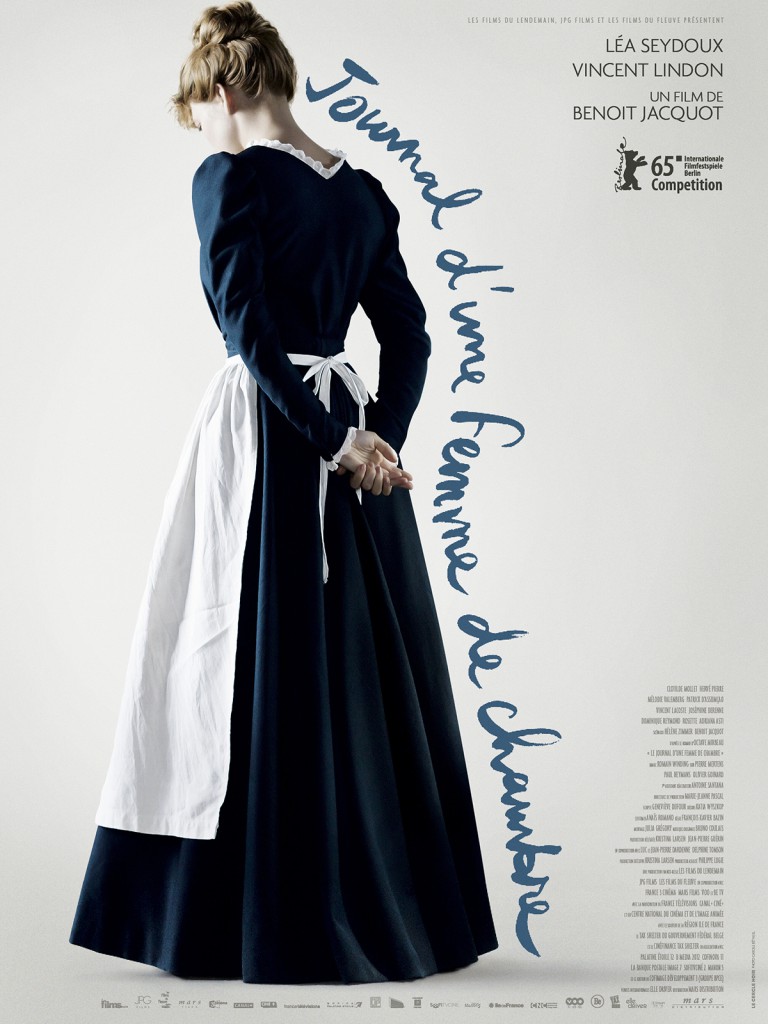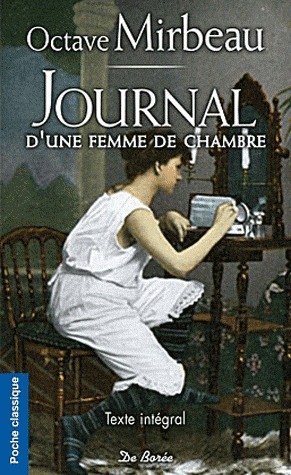Eliza Earle Ferguson
University of New Mexico
From the very first scene of Benoît Jacquot’s adaptation of Octave Mirbeau’s 1900 novel, it is apparent that Célestine is a femme de chambre unlike any other. Célestine (Léa Seydoux) arrives smiling and confident in a Parisian placement office crowded with other maids seeking work. She is resplendent in a peacock-blue silk gown trimmed lavishly with lace, in sharp contrast to the faded tones of her comrades’ modest cotton dresses. Though she spars sharply with the employment agent about the kind of conduct — or misconduct — required to retain a good job, she reveals her vulnerability when she ends up asking “please” for a possible job in the provinces. She needs the work. Much as she criticizes the sexual and economic system underpinning bourgeois domesticity, she is compelled to participate in it in order to survive.
The movie portrays Célestine as a rebel who continuously resists her subordinate status as a servant. She arrives at her new job in a small town in Normandy, to work for the Lanlaires, husband and wife. Monsieur (Hervé Pierre) almost immediately attempts to seduce her, while Madame (Clotilde Mollet) subjects her to endless humiliations, beginning with the demand that she change out of her lovely blue dress. Célestine is well armed for the ensuing conflicts with her employers however. In scenes with Monsieur, she alternately encourages and defies his clumsy attempts at seduction: when he offers her a pear in the garden, she accepts the treat but threatens to tell Madame, which subdues him. Against Madame’s constant demands, Célestine grumbles insults and complaints, and lies boldly about some stolen prunes. Evidently she will take forbidden fruit on her own terms.
Secondary characters demonstrate that other domestic servants are not nearly as successful as Célestine in navigating the sexual dangers of their positions. Marianne, the Lanlaires’ cook, reveals that she lost her first job when her boyfriend got her pregnant, and she strangled her child. Later in the film she confesses to Célestine that she is afraid she is pregnant again, this time with Monsieur Lanlaire’s baby. So broken down that she hardly ever lifts her eyes from the floor, Marianne declares she intends to visit Madame Gouin, a local mercière who is also a faiseuse d’anges. Rose, the maid who works next door for a retired army captain, also makes a sexual arrangement with her employer that turns out badly. Rose had agreed to share his bed in exchange for eventually becoming his heir, but when asthma causes her early death, the captain tells Célestine that he had secretly written a new will disinheriting her. He then offers Célestine the same deal: the table and bed of the master and 35 francs a month.
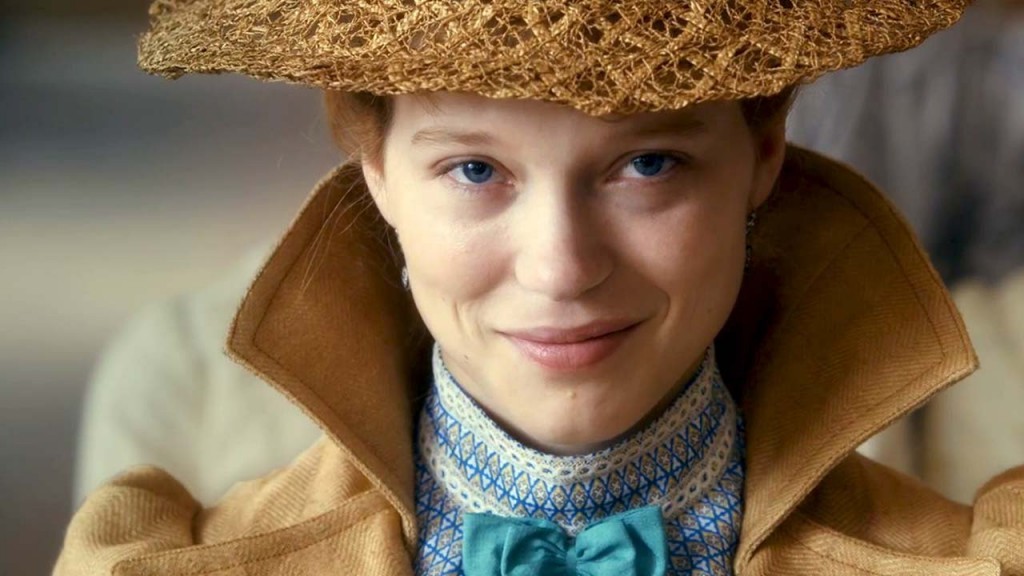 These women are poorly armed because they lack not only Célestine’s savvy, but also her irresistible beauty. Her sexuality is decidedly the source of her greatest power, but her position of servitude makes it impossible for her to fully control it, as demonstrated by her relationships with Joseph (Vincent Lindon), the Lanlaires’ gardener, and Georges (Vincent Lacoste), a young invalid. While many men ask – or demand—that Célestine give herself to them, these are two to whom she says yes. But whether or not she was truly free to do so is debatable. Her sexuality thus dramatizes relationships of domination and submission inherent in her profession and social status.
These women are poorly armed because they lack not only Célestine’s savvy, but also her irresistible beauty. Her sexuality is decidedly the source of her greatest power, but her position of servitude makes it impossible for her to fully control it, as demonstrated by her relationships with Joseph (Vincent Lindon), the Lanlaires’ gardener, and Georges (Vincent Lacoste), a young invalid. While many men ask – or demand—that Célestine give herself to them, these are two to whom she says yes. But whether or not she was truly free to do so is debatable. Her sexuality thus dramatizes relationships of domination and submission inherent in her profession and social status.
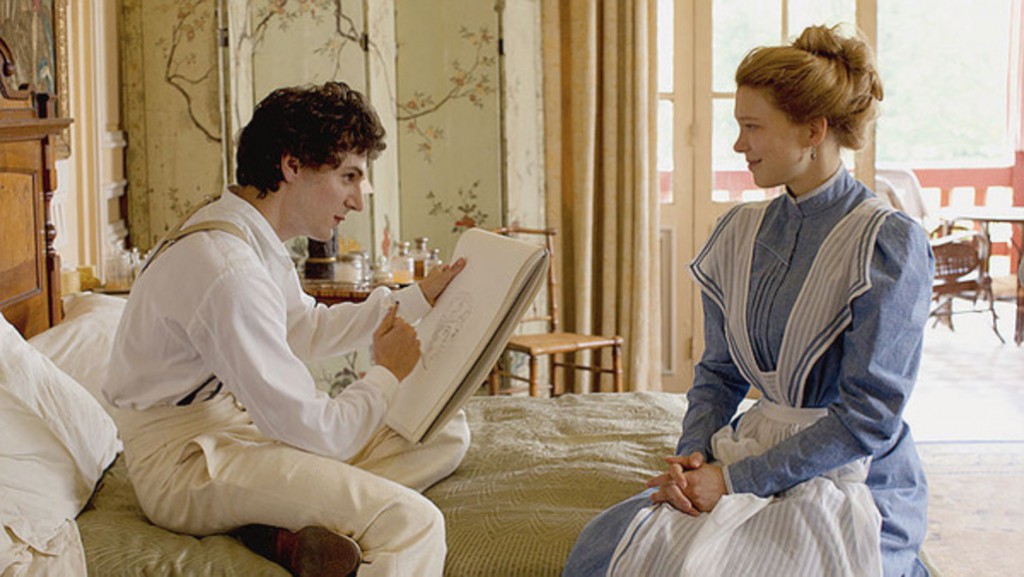 Célestine’s relationship with Georges is the subject of an extended flashback in the movie that interrupts the narrative flow of her time with the Lanlaires. Again, Célestine is offered a new job by the placement office, and she is immediately impressed by the kindness of her new employer, Madame Mendelssohn (unnamed in the original novel) who treats her respectfully, not as “something between a dog and a parakeet.” Célestine is hired to tend the lady’s nineteen-year-old grandson, who is gravely ill with tuberculosis and has been prescribed a treatment of sea baths. In a beautiful house on the coast, Célestine has a “chambre de maître” on the ground floor, and seems to be animated by genuine affection and concern for the old lady and her grandson. She is the young man’s companion, running on the beach and reading poetry with him. In one scene, Célestine reads the final stanzas of Victor Hugo’s poem “La Captive” from Les Orientales. (Perhaps the first lines of the poem would have been even more telling: “Si je n’étais pas captive/ j’aimerais ce pays.”) Georges asks her to call him by his first name, without “Monsieur,” but she says she could never do so; in effect, she can never forget that she is his servant. She gives in to his entreaties to have sex not out of tenderness or pity, but because he accuses her of being afraid to catch his illness. In defiance, she aggressively straddles him and he dies in a paroxysm of bloody coughing while they are having sex. Although in the movie Georges insists that intimacy with Célestine will cure him, which make her actions look almost altruistic, in Mirbeau’s novel Célestine repeats several times that she knew that having sex would overwhelm and kill him. And yet she cannot stop herself from destroying him, she explains, because her desire was so strong.
Célestine’s relationship with Georges is the subject of an extended flashback in the movie that interrupts the narrative flow of her time with the Lanlaires. Again, Célestine is offered a new job by the placement office, and she is immediately impressed by the kindness of her new employer, Madame Mendelssohn (unnamed in the original novel) who treats her respectfully, not as “something between a dog and a parakeet.” Célestine is hired to tend the lady’s nineteen-year-old grandson, who is gravely ill with tuberculosis and has been prescribed a treatment of sea baths. In a beautiful house on the coast, Célestine has a “chambre de maître” on the ground floor, and seems to be animated by genuine affection and concern for the old lady and her grandson. She is the young man’s companion, running on the beach and reading poetry with him. In one scene, Célestine reads the final stanzas of Victor Hugo’s poem “La Captive” from Les Orientales. (Perhaps the first lines of the poem would have been even more telling: “Si je n’étais pas captive/ j’aimerais ce pays.”) Georges asks her to call him by his first name, without “Monsieur,” but she says she could never do so; in effect, she can never forget that she is his servant. She gives in to his entreaties to have sex not out of tenderness or pity, but because he accuses her of being afraid to catch his illness. In defiance, she aggressively straddles him and he dies in a paroxysm of bloody coughing while they are having sex. Although in the movie Georges insists that intimacy with Célestine will cure him, which make her actions look almost altruistic, in Mirbeau’s novel Célestine repeats several times that she knew that having sex would overwhelm and kill him. And yet she cannot stop herself from destroying him, she explains, because her desire was so strong.
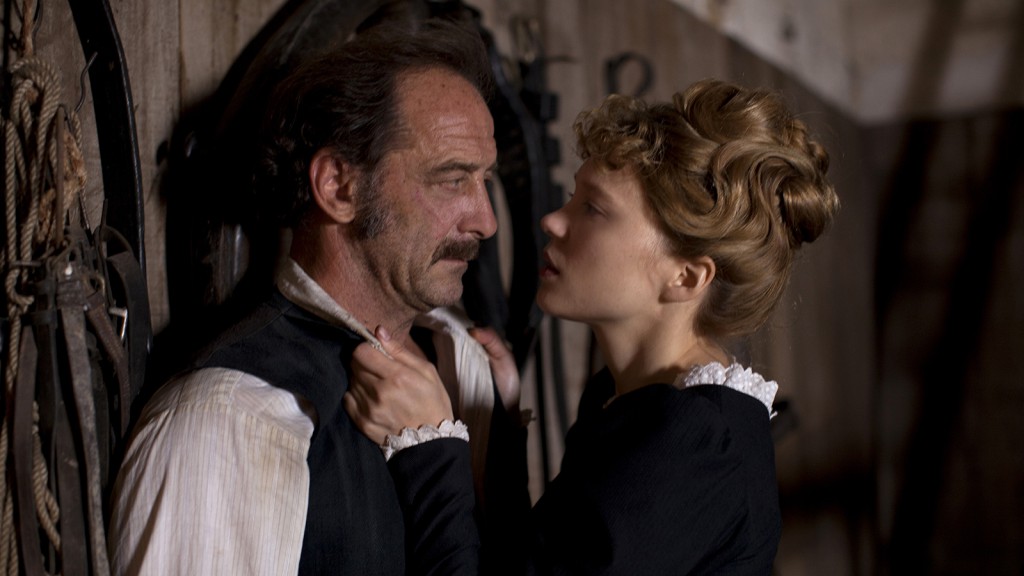 The information in the novel that she felt herself subjected to such compelling desire makes her relationship with Joseph more comprehensible than it appears in the film. Joseph is an extraordinarily repugnant character. He is a virulent anti-Semite, who reads La Libre Parole and distributes anti-Semitic pamphlets in the region with the help of the vicar. What with his brutish demeanor, Célestine suspects that he raped and murdered little Claire, whose body is found in the forest. Although he appears to be a devoted and trustworthy servant to the Lanlaires, whom he has served for many years, he is in fact playing the long game with them, so that he will not even be suspected when he stages a break-in and steals their considerable collection of silver. For the first two-thirds of the movie, Joseph spends a considerable amount of time lurking around corners watching Célestine. “You are like me,” he tells her. The proposition he finally makes to Célestine is more than just sex: it is to marry him “par amitié” and preside over a bar he plans to buy in Cherbourg, where she would attract and service the clientele. “I dream of you, Célestine,” he declares, and then the scene cuts to a vision of Célestine dressed in a square-necked gown laughing with soldiers at a bar, very reminiscent of Manet’s “Bar at the Folies-Bergère.”
The information in the novel that she felt herself subjected to such compelling desire makes her relationship with Joseph more comprehensible than it appears in the film. Joseph is an extraordinarily repugnant character. He is a virulent anti-Semite, who reads La Libre Parole and distributes anti-Semitic pamphlets in the region with the help of the vicar. What with his brutish demeanor, Célestine suspects that he raped and murdered little Claire, whose body is found in the forest. Although he appears to be a devoted and trustworthy servant to the Lanlaires, whom he has served for many years, he is in fact playing the long game with them, so that he will not even be suspected when he stages a break-in and steals their considerable collection of silver. For the first two-thirds of the movie, Joseph spends a considerable amount of time lurking around corners watching Célestine. “You are like me,” he tells her. The proposition he finally makes to Célestine is more than just sex: it is to marry him “par amitié” and preside over a bar he plans to buy in Cherbourg, where she would attract and service the clientele. “I dream of you, Célestine,” he declares, and then the scene cuts to a vision of Célestine dressed in a square-necked gown laughing with soldiers at a bar, very reminiscent of Manet’s “Bar at the Folies-Bergère.”
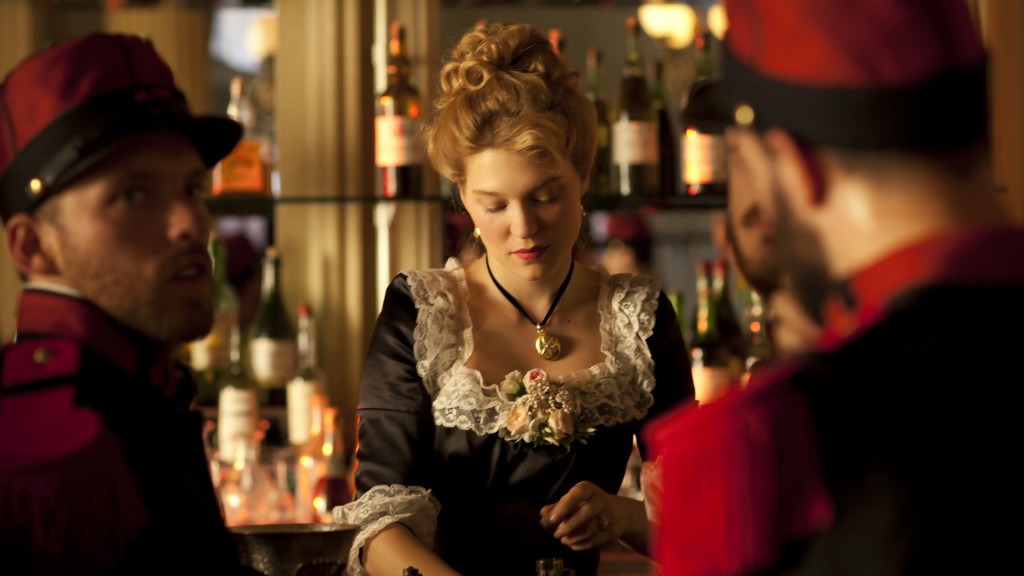 In effect, the proposition is to put her sexuality entirely at Joseph’s disposal, and she accepts. She assists him in his theft of the silver (a scene that does not occur in the novel), and the movie ends with her driving off in the night with Joseph towards Cherbourg. “Joseph me tient, me possède comme un démon, et je suis heureuse d’être à lui,” she declares in a voice over. “Je ferai tout ce qu’il voudra que je fasse . . . jusqu’au crime.” Her words in this final scene are almost exactly the same she had spoken to Madame Mendelssohn in the placement office, that she would do anything asked of her. (In the case of Georges, however, the crime of murder was perhaps inadvertent, or at least, only Célestine knew that loving him would cause his death.) Ultimately, Célestine has the power to choose her own master or mistress; hers is not a story of liberation. “Faut-il que nous ayons tout de même la servitude dans le sang,” (must be that we have servitude in our blood after all) she muses in an earlier scene.
In effect, the proposition is to put her sexuality entirely at Joseph’s disposal, and she accepts. She assists him in his theft of the silver (a scene that does not occur in the novel), and the movie ends with her driving off in the night with Joseph towards Cherbourg. “Joseph me tient, me possède comme un démon, et je suis heureuse d’être à lui,” she declares in a voice over. “Je ferai tout ce qu’il voudra que je fasse . . . jusqu’au crime.” Her words in this final scene are almost exactly the same she had spoken to Madame Mendelssohn in the placement office, that she would do anything asked of her. (In the case of Georges, however, the crime of murder was perhaps inadvertent, or at least, only Célestine knew that loving him would cause his death.) Ultimately, Célestine has the power to choose her own master or mistress; hers is not a story of liberation. “Faut-il que nous ayons tout de même la servitude dans le sang,” (must be that we have servitude in our blood after all) she muses in an earlier scene.
 The film stays true to the spirit of Mirbeau’s novel, in its virulent critique of the bourgeois social order, anti-Semitism, Catholicism, and the French military (as personified in the bizarre character of Captain Mauger). It also adheres closely to key elements of the plot and to the period setting, unlike the earlier film adaptations of the novel by Jean Renoir (1946) and Luis Buñuel (1964). Since the novel is composed of numerous flashbacks to Célestine’s earlier jobs, it was perhaps inevitable that much of this material would be omitted in the film, but the overall result renders Célestine a more sympathetic character. The viewer knows much less than the reader does about Célestine’s inner thoughts and motivations, such as in her seduction of Georges, rendering them less morally ambiguous. Célestine embodies every nightmare of her bourgeois employers throughout her career as a maid. She knows the intimate details of her employers’ lives and uses that knowledge against them. She seduces sons and grandsons, sleeps with the master, and steals from the mistress. Above all, she has nothing but scorn for the hypocrisy of bourgeois domesticity. Turning her knowing gaze on her employers throughout her diary, she exposes their corruption and depravity. Yet in the novel, she is hardly less corrupt and depraved herself.
The film stays true to the spirit of Mirbeau’s novel, in its virulent critique of the bourgeois social order, anti-Semitism, Catholicism, and the French military (as personified in the bizarre character of Captain Mauger). It also adheres closely to key elements of the plot and to the period setting, unlike the earlier film adaptations of the novel by Jean Renoir (1946) and Luis Buñuel (1964). Since the novel is composed of numerous flashbacks to Célestine’s earlier jobs, it was perhaps inevitable that much of this material would be omitted in the film, but the overall result renders Célestine a more sympathetic character. The viewer knows much less than the reader does about Célestine’s inner thoughts and motivations, such as in her seduction of Georges, rendering them less morally ambiguous. Célestine embodies every nightmare of her bourgeois employers throughout her career as a maid. She knows the intimate details of her employers’ lives and uses that knowledge against them. She seduces sons and grandsons, sleeps with the master, and steals from the mistress. Above all, she has nothing but scorn for the hypocrisy of bourgeois domesticity. Turning her knowing gaze on her employers throughout her diary, she exposes their corruption and depravity. Yet in the novel, she is hardly less corrupt and depraved herself.

Mirbeau’s novel engages fully with the anxieties and social reform movements around female domestic servants and sexuality in the fin de siècle, providing details that are gratifying from the standpoint of social and cultural history. Célestine is an impoverished migrant from Brittany. When her father dies and her mother becomes an alcoholic and a prostitute, Célestine receives her education and training from nuns before yielding to the lure of Paris. At one point of unemployment she finds shelter with the sisters of “Notre Dame des Trente-Six Douleurs,” who turn out to be just as exploitative as her usual employers. The novelist Paul Bourget and the dramatist Jules Lemaître each make cameo appearances, both unable to make sense of Célestine’s persona. Motifs of popular culture and sensational crime stories pepper the narrative, including the white slave trade, a woman cut in pieces, and the gruesome murder of little Claire. Célestine constantly balances on the edges of prostitution, while the various sexual practices of Célestine and her employers illustrate the perceived decadence of the era, offering as well a fin-de-siècle echo of eighteenth-century libertine literature starring chambermaids. To frame the novel or film in historical context, Rachel Fuchs’s Gender and Poverty in Nineteenth-Century Europe and her work on the plight of women who were Poor and Pregnant in Paris would be natural matches.[1] Leslie Page Moch’s Pariahs of Yesterday speaks to the emigration of Bretons to Paris.[2] Relevant social reform efforts are analyzed in Gender and the Politics of Social Reform,[3] as well as recent work on Catholic charities by Sarah Curtis.[4] Sexuality at the Fin de Siècle can shed light on contemporary ideas and practices.[5] On bourgeois domesticity and domestic service, the classics by Bonnie Smith and Anne Martin-Fugier have yet to be surpassed.[6]
The novel is readily available in translation and would resonate in a history course engaged with its themes. However, the film in its historically accurate visual detail can provide an additional dimension for students interested in the era. An excellent sequence for classroom use starts approximately 21 minutes into the film. Célestine has just returned from church, Sunday morning being her only time off during the week. Madame Lanlaire scolds her for being late and compels her to tidy her bedroom and clean the chamber pot while Célestine still wears her own Sunday clothes. The costumes provide helpful visual cues to the characters’ status: Célestine’s form-fitting and stylish summer outfit contrasts markedly with Madame’s more opulent yet frumpy and outdated garments. Then Madame issues a series of orders to fetch her a needle, thread, and finally scissors from an upper floor, showcasing her petty tyranny as well as Célestine’s grudging compliance. Beginning at about 23 minutes is the previously mentioned scene where Monsieur Lanlaire offers Célestine a pear and attempts to seduce her as she hangs laundry to dry in the garden, under Joseph’s watchful eye. This time she is in her black working dress, whose modest yet provocative v-cut at her nape offers a hint of her sensuality, while Monsieur Lanlaire sports a rumpled dressing gown. These scenes could fuel discussions about gender and class status, the physical and psychological rigors of working as a maid, and perhaps even the ongoing problem of income inequality.
Benoît Jacquot, Director, Journal d’une femme de chambre [Diary of a Chambermaid], 2015, Color, 96 min, France, Les Films du Lendemain, JPG Productions, Les Films du Fleuve, France 3 Cinéma, Mars Films, VOO, BE TV. Cohen Media Group has acquired the US rights and will distribute the film in 2016.
NOTES
- Rachel Fuchs, Gender and Poverty in Nineteenth-Century Europe (Cambridge: Cambridge University Press, 2005); Poor and Pregnant in Paris: Strategies for Survival in Nineteenth-Century Paris (Rutgers, NJ: Rutgers University Press, 1992).
- Leslie Page Moch, Pariahs of Yesterday: Breton Migrants in Paris (Durham, NC: Duke University Press, 2012).
- Elinor Accampo, Rachel Fuchs, and Mary Lynn Stewart, eds., Gender and the Politics of Social Reform in France, 1870-1914 (Baltimore and London: The Johns Hopkins University Press, 1995).
- Sarah Curtis, “’Charitable Ladies:’ Gender, Class, and Religion in Mid-Nineteenth-Century Paris” Past and Present 177 (November 2002), 121-156.
- Peter Cryle and Christopher E. Forth, eds. Sexuality at the Fin de Siècle: The Making of a “Central Problem” (Newark, DE: University of Delaware Press, 2008).
- Bonnie Smith, Ladies of the Leisure Class: The Bourgeoises of Northern France in the Nineteenth Century (Princeton, N.J.: Princeton University Press, 1981); Anne Martin-Fugier, La Place des bonnes: La domesticité féminine à Paris en 1900 (Paris: Perrin/ Grasset & Fasquelle, 2004 [1979]).
